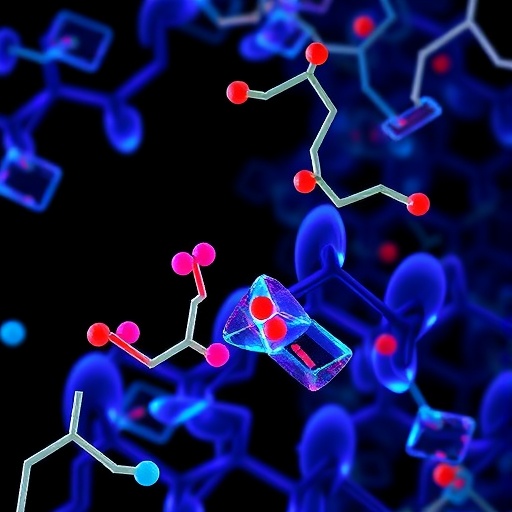In recent developments in the realm of targeted cancer therapies, the focus has shifted toward a deeper understanding of specific protein interactions that govern cell division and proliferation. One such protein, Aurora B kinase, has come under scrutiny for its pivotal role in mitosis—specifically in the processes that enable chromosomes to align and segregate properly. This kinase is a critical member of the Aurora family of serine/threonine kinases and has emerged as a promising target for drug development aimed at treating various cancers. The enhanced understanding of Aurora B’s structure and function offers a compelling avenue for the design of small molecule inhibitors that could arrest tumor growth and trigger cancer cell apoptosis.
In their groundbreaking study, researchers Xie, Shi, Tang, and their colleagues unveil innovative strategies in the design and synthesis of novel indolinone inhibitors targeting Aurora B kinase. Utilizing fragment-based drug discovery (FBDD), this team has employed a systematic approach to design these inhibitors, representing a significant leap forward in the development of cancer therapeutics. FBDD is a highly effective method that involves identifying small chemical fragments that interact with a target protein and subsequently optimizing these fragments into potent inhibitors. The methodology allows for the identification of hits that can lead to the development of high-affinity drugs, thus addressing a crucial bottleneck in drug discovery.
The impetus behind this research stems from the urgent need for new therapeutics that effectively target the aberrant signaling pathways associated with cancer progression. Current therapies often suffer from limitations due to their inability to selectively target tumor cells without affecting normal cells. By honing in on Aurora B kinase, the research team is not only aiming to enhance selectivity but also to minimize off-target effects, thereby improving the safety profile of future therapeutic agents. The indolinone structure serves as an excellent scaffold owing to its multifaceted biological activity and structural versatility, which positions it favorably for modification to improve potency and pharmacokinetics.
Crucially, the researchers employed sophisticated computational modeling and structural biology techniques to delineate the binding sites on the Aurora B kinase. This detailed understanding informed their design strategy, allowing them to create inhibitors with favorable interactions at critical sites on the kinase. Coupling this structural insight with high-throughput screening of fragment libraries led to the identification of promising candidates that exhibited significant inhibitory effects on Aurora B activity. The synergy between computational predictions and empirical validation is a testament to the rigorous nature of the study, showcasing the intricate dance between theoretical and experimental sciences.
Synthesis of the candidate inhibitors followed a meticulous route, where the researchers employed a combination of traditional organic synthesis and modern methodologies such as click chemistry. This approach provided not only a means to produce the compounds efficiently but also afforded the flexibility to introduce various substituents that could further enhance their anti-cancer properties. The researchers conducted in-depth characterization of these synthesized compounds, including assessments of their binding affinity, specificity for Aurora B, and evaluations of their efficacy in cellular assays.
The results were promising, revealing that several indolinone derivatives significantly inhibited Aurora B activity, leading to cell cycle arrest in cancer cell lines. Importantly, these findings underscore the potential of targeting Aurora B kinase as a viable strategy for cancer treatment. The selectivity of these inhibitors presents an exciting opportunity to develop treatments that specifically target cancerous cells while leaving healthy cells unharmed—a critical factor that currently plagues many existing cancer therapies.
Moreover, the researchers conducted a comprehensive analysis of the molecular dynamics of the Aurora B kinase-inhibitor complexes, providing further insight into the mechanism of inhibition. Understanding how these small molecules interact at the atomic level not only informs the current study but also sets the stage for future drug design initiatives, as it lays out a roadmap for creating even more potent and selective inhibitors. The research team is hopeful that these inhibitors can move forward into preclinical and clinical evaluation, broadening the therapeutic arsenal against resistant tumors.
As the field of cancer therapeutics continues to evolve, studies like this one highlight the importance of innovative strategies in drug discovery. The FBDD approach harnesses the power of structural biology and medicinal chemistry, paving the way for the next generation of cancer inhibitors. The implications of this research are profound, potentially leading to improved outcomes for patients who have few options remaining. This work not only reinforces the role of Aurora B kinase as a critical target in oncology but also signifies a monumental step toward personalized medicine where treatments can be tailored to individual tumor characteristics.
Moreover, collaborations between chemists, biologists, and clinicians are essential, and this study exemplifies the interdisciplinary approach needed to tackle the complexities of cancer. As the research progresses from the laboratory bench to clinical trials, the collective goal remains the same: to transform our understanding of cancer biology into tangible therapies that can save lives. Indeed, the pursuit of effective inhibitors, as demonstrated in this research, holds the promise of changing the landscape of cancer treatment for the better.
In conclusion, the design and synthesis of novel indolinone Aurora B kinase inhibitors represent a significant advance in the quest for targeted cancer therapies. By combining fragment-based drug discovery with innovative synthetic strategies, the research team has unveiled a class of compounds that could be pivotal in altering cancer treatment paradigms. The intersection of cutting-edge science and unwavering dedication reflects an optimism for the future of cancer therapeutics, and the scientific community watches eagerly as these findings potentially evolve into life-altering treatments in the coming years.
Subject of Research: Aurora B kinase inhibitors
Article Title: Design and synthesis of novel indolinone Aurora B kinase inhibitors based on fragment-based drug discovery (FBDD)
Article References:
Xie, B., Shi, M., Tang, D. et al. Design and synthesis of novel indolinone Aurora B kinase inhibitors based on fragment-based drug discovery (FBDD). Mol Divers (2025). https://doi.org/10.1007/s11030-025-11353-w
Image Credits: AI Generated
DOI: 10.1007/s11030-025-11353-w
Keywords: Aurora B kinase, cancer therapy, indolinone inhibitors, fragment-based drug discovery, targeted therapy.




